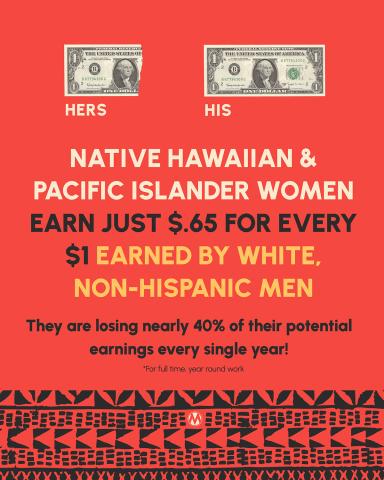
We cannot and will not close the gender pay gap if we don’t address racial pay gaps.
On Native Hawaiian & Pacific Islander Women’s Equal Pay Day: Demand Congress and the Trump administration end the attack.
Pop Quiz: How many additional months in a year do Native Hawaiian and Pacific Islander (NHPI) women have to work to earn what white, non-Hispanic men make in one year?
If you said 8 months, you’re sadly correct. It’s unfair, yet true: NHPI women make just 65 cents on the dollar compared to white men, and when you factor in part-time and seasonal work, that number drops down to 61 cents, which is NOT okay.
Today, August 28th, marks Native Hawaiian and Pacific Islander (NHPI) Women’s Equal Pay Day and we need you to take action!
→ Sign our letter urging Congress to support policies that help reduce these egregious pay disparities NHPI women face every single day.
Eight extra months is too long to wait to achieve pay equity. Especially since NHPI mothers, who are often pillars in their communities, are holding entire families together and lifting our economy while working more for less. They play significant roles in essential fields that our entire nation benefits from every day. Yet, they’re consistently being denied a livable wage, let alone the compensation they actually deserve. What does that mean for their families, communities, and our economy?
The bottom line: Lower earnings equal fewer resources for childcare and food budgets, less access to housing options, and smaller safety nets or none at all. It also means less economic boost because women and moms make the majority of consumer purchasing decisions in our nation.
Something that could help fix this economic dilemma? Data!
That’s because wage fairness begins with being SEEN, counted, and paid what you’re worth.
There currently isn’t any federal tracking that can help us understand the fullest picture of wage disparity in this country. In fact, the data we do have to capture what NHPI women earn is buried under aggregated sources and that alone is failing these communities.
We can no longer lump subgroups like Fijian, Tongan, Marshallese, Chuukese, and Palauan women and moms, who make even less than NHPI women, into the broader Asian American and Pacific Islander category. These tribes have their own cultures, languages, ethics and belief systems that are erased every time that happens. If Congress steps in to support federal tracking policies for NHPI, we would see a real change in data accessibility that could lead to a real change in the pay gap.
The horrific wage gap that NHPI women face is a structural and systemic problem and there are solutions if Congress makes them a priority.
(By the way, have you or someone you love faced workplace discrimination or unfair pay? Sharing personal stories with our lawmakers is a powerful tool in the fight against discriminatory wage gaps! Tell us about your experience!)



The views and opinions expressed in this post are those of the author(s) and do not necessarily reflect those of MomsRising.org.
MomsRising.org strongly encourages our readers to post comments in response to blog posts. We value diversity of opinions and perspectives. Our goals for this space are to be educational, thought-provoking, and respectful. So we actively moderate comments and we reserve the right to edit or remove comments that undermine these goals. Thanks!